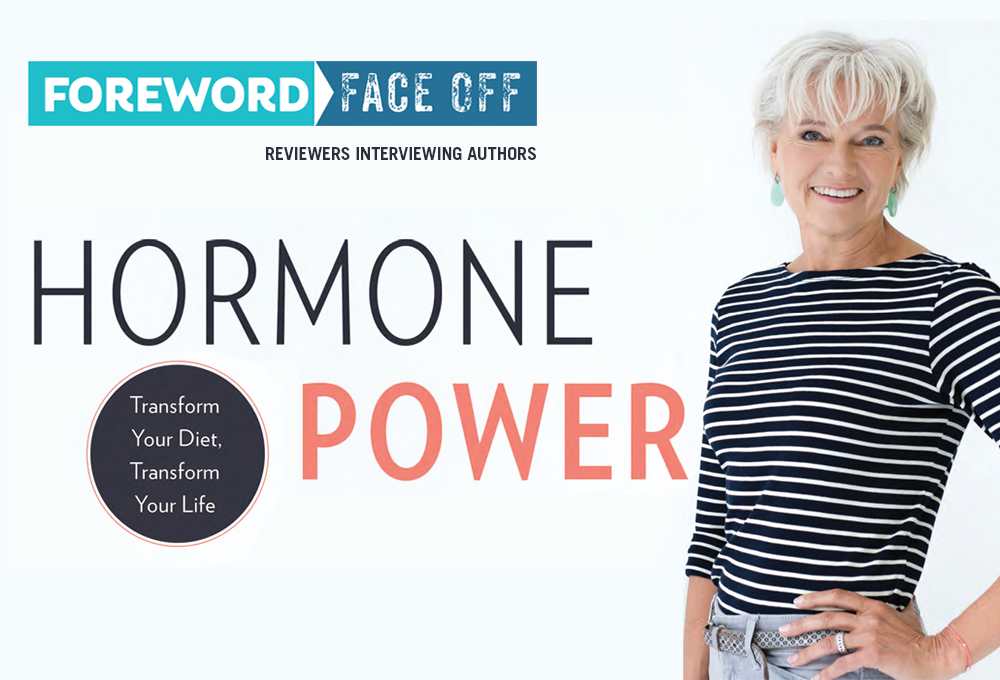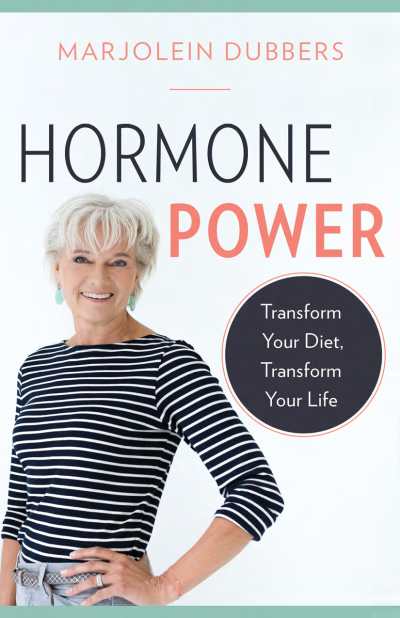Reviewer Melissa Wuske Interviews Marjolein Dubbers, Author of Hormone Power: Transform Your Diet, Transform Your Life

This week, we’re excited to hear from Marjolein Dubbers, an expert in nutrition and women’s health. The author of Hormone Power: Transform Your Diet, Transform Your Life, Marjolein believes standard diets are nonsensical because each individual woman’s body is its own unique ecosystem based on the way her hormones interact with the food she consumes.
The biggest problem, she believes, is that a great many women suffer needlessly because health care providers don’t factor in the variables. To secure their own health and wellbeing, Marjolein advocates for women to learn the nuances of their bodies and adapt to an individualized diet that works.

In a very positive review in the May/June issue of Foreword Reviews, Melissa Wuske wrote about the empowering message in Hormone Power, so we quickly set up this conversation between Marjolein and Melissa—with help from the good people at Greystone Books.
Melissa, take it from here.
Much of the book focuses on helping women understand their bodies, before diving into more specific dietary suggestions. It’s a stark contrast to dietary advice that simply tells people what to do. Why is this foundational understanding so critical?
It’s old-fashioned to stick to simple lists of daily or weekly menus. Diets or eating patterns that are called suitable for everyone simply don’t exist. I want to teach women to really listen to their bodies again. Even healthy food such as avocado or eggs are not suitable for everyone. If you’re aware of how female hormones work and which signals or symptoms can be linked to certain hormones, then you possess important information to improve your health. For example, if you feel that your blood sugar level is not stable because you start to feel hungry again just two hours after breakfast, you can adjust your diet accordingly. Only understanding the signals your body gives you can you put together a menu that fits you.
Skeptics often think something like, “Generations of people have eaten the way I eat, and they were fine.” What’s the flaw in this thinking? Is it a myth, are people missing information, are they nostalgic for a time that never really existed, or something else?
To be honest, we don’t eat like the generations before us have eaten. That is truly a misconception! Today’s wheat, for example, has been processed so badly that it contains much more gliadin (a sticky protein) than the wheat grown roughly 50 years ago. The gliadin of today has caused many people to become intolerant to gluten or wheat. Today’s fruit has been made much sweeter than it used to be by means of food breeding: a kiwi was a sour fruit back in the day, but now it’s sweet. Today’s vegetables contain considerably less vitamins and minerals than they did 50 years ago and are therefore less nutritious. In addition, many more people nowadays eat processed food that contains plenty of sugars and chemicals. So, in fact, we eat very differently from our ancestors. Just look around you: everyone is unhealthier than they were a few generations ago. These changes to our food have hugely impacted us.
Some of what your book recommends feels extreme, at least by comparison to many women’s current diet. Extremes are common in today’s landscape of diet wisdom—for example, none of this, only that, or intense 30-day challenges. Why do you think extremes are common? How are they beneficial? Are there risks?
If we take a look at people’s health in America and Europe, we can conclude that we have never been so sick and overweight before. So, we may need a radical change. We have been eating far too much sugar, carbs, and processed foods that contain chemical additives. Besides, we are mistakenly frightened of healthy fats and we eat far too few vegetables. When women start eating less sugar and carbs and more healthy fats and vegetables, I see miracles happen.
I do not believe in extreme diets, though. You won’t find those in my book. I think sometimes you should surprise your body with something that’s not super healthy, like a brownie. A well-nourished body should be able to handle that without any problems! I tell women not to be a perfectionist when it comes to food. Why not indulge yourself now and then?!
“I should change, but I don’t want to.” This is many women’s response to the clear, practical wisdom you provide. What motivational tips do you have to help women get started and sustain their efforts?
I always say: “We cannot motivate people, we can only inspire them.” If some women are not ready to change, then they are simply not ready. I believe that women can become more powerful by eating the right foods and taking better care of themselves! In my opinion, women’s health is really undermined by, for example, processed foods, a lack of exercise, too much stress, and chemical substances that exist in our environments. I encourage women to change old patterns in their lives, step-by-step, and create new patterns. I hope that when women stand up for themselves and for their health and become visible, more women will notice and say: What she has, I want too.’
It often seems the health care establishment has failed women. For example, why don’t doctors teach women about the ways their bodies work, as you have? Or, more startling, do most doctors even fully understand how hormones work and how dietary choices influence health? Why do you think this has happened? Do you see any glimmers of hope in the medical establishment regarding women’s health?
I think health care has failed women, but also people of all genders and ages. Doctors frequently offer prescriptions and sometimes medical interventions, like surgeries, but rarely is the health care establishment concerned with prevention—with real healing through adopting a healthier diet and lifestyle. Based on my own experience, I have found that doctors know hardly anything about the female body, hormones, and nutrition. I believe there are big financial interests that keep this going. Companies and institutions that can make money from sick people have no interest in curing them. Fortunately, I see more and more doctors with the courage to stick out their necks and publicize dissenting opinions. I am optimistic about the future, also, because more people are starting to realize that we have taken a dead-end path in terms of our health and that it is necessary to make safer, different choices.
You close the book by talking about the concept of a “landscape of longing”—I love that phrase. That concept—what an individual woman hopes of and dreams about—is central to your personal, positive approach. What happens if a woman follows your advice, which is largely the same for every woman, without tapping into that personal vision?
I think that every woman needs a ‘landscape of longing’ to inspire and motivate her to create new habits. It makes it so much easier. Eating healthy is a means to an end, not an end in and of itself. Even feeling healthy and vital is not the ultimate goal. No woman says on her deathbed: I had a great life because I’ve always been healthy and vital. We want to do something beautiful with this feeling of vitality. We want to show ourselves to the world, we want to speak up, and we want to make the world a better place. This vision of our own future: that’s the motivation we all need to make different choices—every single day.
As you’ve changed your own diet, what’s your favorite new food that you’ve discovered or discovered new appreciation for?
That’s probably avocado! I usually never ate avocado because I thought it would make me fat. Now I know they contain lots of healthy fats and I eat them almost on a daily basis. I love to use them in both savory and sweet dishes. Avocado and coconut milk chocolate mousse: yummy!
Melissa Wuske
